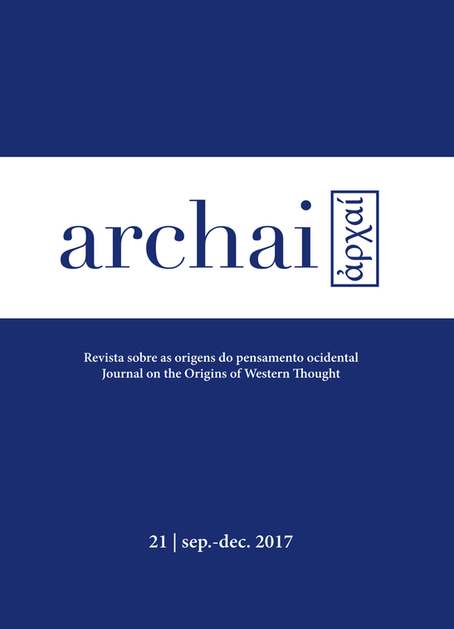The memorization of epitomes in the Epicurean community and the redefinition of philosophical praxis
DOI:
https://doi.org/10.14195/1984-249X_21_4Keywords:
Epicureanism, Epitomes, Memorization practices, RepetitionAbstract
This paper aims to offer a critical reading of a widely favoured interpretation of Epicurean philosophy, which assumes, in broad terms, that Epicurean pedagogy consisted primarily in the practice of memorizing the doctrines included in the Epicurean epitomes. I will suggest, on the contrary, that there are good reasons to believe that Epicurean pedagogy had little to do with the image delivered by that line of interpretation. I will propose an alternative reading, which takes memorization practices off of the center of the stage and reintegrates the epitomes to the pedagogical dynamics that were peculiar to the Epicurean community.
Downloads
References
ALBERTI, A. (1995). The Epicurean theory of law and justice. En: LAKS, A.; SCHOFIELD, M. (eds.). Justice and Generosity: Studies in Hellenistic Social and Political Philosophy: Proceedings of the Sixth Symposium Hellenisticum. Cambridge, Cambridge University Press, p.161”“190.
ARMSTRONG, D. (2008). “‘Be angry and sin not’”: Philodemus versus the Stoics on natural bites and natural emotions. En: FITZGERALD, J. T. (ed.). Passions and Moral Progress in Greco-Roman Thought. London, Routledge, p.79”“121.
ARMSTRONG, J. M. (1997). Epicurean justice. Phronesis 42, nº 3, p. 324-334.
ASMIS, E. (2001). Basic education in Epicureanism. En: TOO, Y. L. (ed.). Education in Greek and Roman Antiquity. Leiden, Brill, p.209”“239.
BOBZIEN, S. (2006). Moral responsibility and moral development in Epicurus’ philosophy. En:
REIS, B. (ed.). The Virtuous Life in Greek Ethics. Cambridge, Cambridge University Press, p.206”“229.
COOPER, J. M. (2012). Pursuits of Wisdom: Six Ways of Life in Ancient Philosophy from Socrates to Plotinus. Princeton, Princeton University Press.
JUFRESA, M. (1994) (ed.). Epicuro, Obras. Barcelona, Altaya.
ERLER, M. (1996). Philologia medicans. La lettura delle opere di Epicuro nella sua scola. En: GIANNANTONI, G.; GIGANTE, M. (eds.). Epicureismo greco e romano. Atti del Congresso Internazionale, Napoli, 19-26 maggio 1995. Napoli, Bibliopolis, v. 2, p.513”“526.
ERLER, M. (2011). Autodidact and student: on the relationship of authority and autonomy in Epicurus and the Epicurean tradition. En: FISH, J.; SANDERS, K. R. (eds.). Epicurus and the Epicurean Tradition. Cambridge, Cambridge University Press, p.9”“28.
GARCÍA GUAL, C. (2002). Epicuro. Madrid, Alianza Editorial.
________ (2007) (ed.). Diógenes Laercio, Vitae philosophorum] Vidas y opiniones de los filosofos ilustres. Madrid, Alianza.
HANKINSON, R. J. (2013). Lucretius, Epicurus, and the logic of multiple explanations. En: LEHOUX, D.; MORRISON, A. D.; SHARROCK, A. (eds.). Lucretius: Poetry, Philosophy, Science. Oxford, Oxford University Press, p. 69”“98.
HESSLER, J. E. (2011). Proposte sulla data di composizione e il destinatario dell’Epistola a Meneceo. Cronache Ercolanesi, v. 41, p.7”“11.
INDELLI, G.; TSOUNA, V. (1997) (eds.). Filodemo, De electionibus et fugis] On choices and avoidances. Napoli, Bibliopolis.
KERFERD, G. B. (1978). What does the wise man know? En: RIST, J. M. (ed.). The Stoics. Berkeley: University of California Press, p.125”“136.
MITSIS, P. (2007). The institutions of Hellenistic philosophy. En: ERSKINE, A. (ed.). A Companion to the Hellenistic World. Malden: Blackwell, p.464”“476.
NUSSBAUM, M. (1993). Argumentos terapéuticos: Epicuro y Aristóteles. En: SCHOFIELD, M.; STRIKER, G. (eds.). Las normas de la naturaleza. Buenos Aires, Manantial, p.41”“83.
NUSSBAUM, M. (1996). The Therapy of Desire. Theory and Praxis in Hellenistic Ethics. Nueva Jersey, Princeton University Press.
Downloads
Published
How to Cite
Issue
Section
License
Given the public access policy of the journal, the use of the published texts is free, with the obligation of recognizing the original authorship and the first publication in this journal. The authors of the published contributions are entirely and exclusively responsible for their contents.
1. The authors authorize the publication of the article in this journal.
2. The authors guarantee that the contribution is original, and take full responsibility for its content in case of impugnation by third parties.
3. The authors guarantee that the contribution is not under evaluation in another journal.
4. The authors keep the copyright and convey to the journal the right of first publication, the work being licensed under a Creative Commons Attribution License-BY.
5. The authors are allowed and stimulated to publicize and distribute their work on-line after the publication in the journal.
6. The authors of the approved works authorize the journal to distribute their content, after publication, for reproduction in content indexes, virtual libraries and similars.
7. The editors reserve the right to make adjustments to the text and to adequate the article to the editorial rules of the journal.



